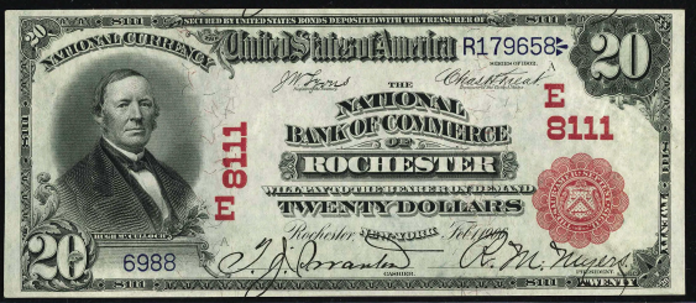Twenty Dollar Notes › Nationals › 1902 Twenty Dollar National Bank Notes › Oklahoma Charters › 1902 $20 Tuttle Oklahoma First National Bank
Get Value Now
| Item | Info |
|---|---|
| Series | 1902 |
| Charter | #8475 First National Bank of Tuttle, Oklahoma |
| Year Chartered | 1906, 462 Banks Chartered |
| City Info | Tuttle is a city in Grady County, Oklahoma, United States. The population was 6,019 with the close of the 2010 census, seeing a 40.2% increase from 4,294 at the close of the 2000 census. Located east of the Chisholm Trail, Tuttle was developed as a farming and ranching community. The town was platted in 1901 and the land was purchased Chickasaw land from the Colbert Family. The town is named after local rancher James H. Tuttle, a Choctaw by marriage and the father of automobile dealer and politico Holmes Tuttle. The right-of-way for the St. Louis and San Francisco Railway came from the tribal allotment of Frances Schrock, a Choctaw. Schrock Park is named after her. Tuttle's post office was established in 1902, and the town was incorporated in 1906. Source: Wikipedia |
| Similar Cities | If your note doesn't match try: 1. Tuttle, North Dakota - First National Bank |
| Seal Varieties | Red, Blue |
| See Also | If your note doesn't match try: 1. 1905 $20 Gold Certificate 2. 1906 $20 Gold Certificate |
| Other Info | 1. Value depends on notes known for charter, condition and market demand. |
| Neat Fact | Notes from common charters are less valuable compared to rarer charters. Value also depends on type, denomination and total notes known for city, state and region. Ultimate determination of value is collector demand. |
No Obligations Offers and Appraisals
Please submit a good photo or scan. It will be identified and evaluated. Understand there may be subtle differences between the image you see above and your note. Signatures, design, markings and note condition will determine the offer price. Notes in Uncirculated or better condition receive the best offers.
Appraisals can be estimated for wholesale and retail prices. Wholesale is what dealers typically pay. Retail is what a collector might pay. Retail is slightly higher in most cases.
Please visit this page for USA Paper Money Reference. Do not treat this page as a reference guide, it is for appraisal and acquisition purposes only.
